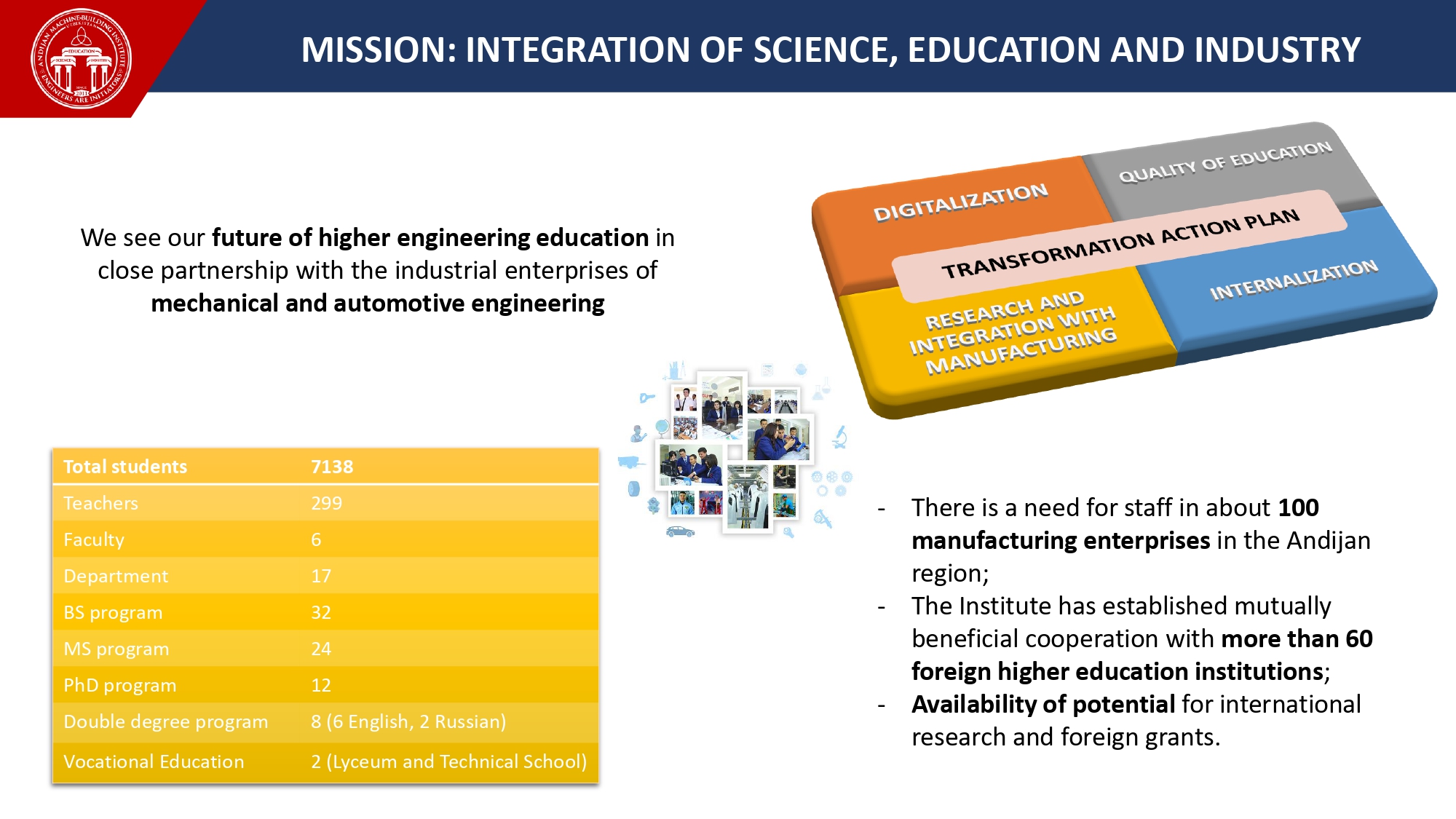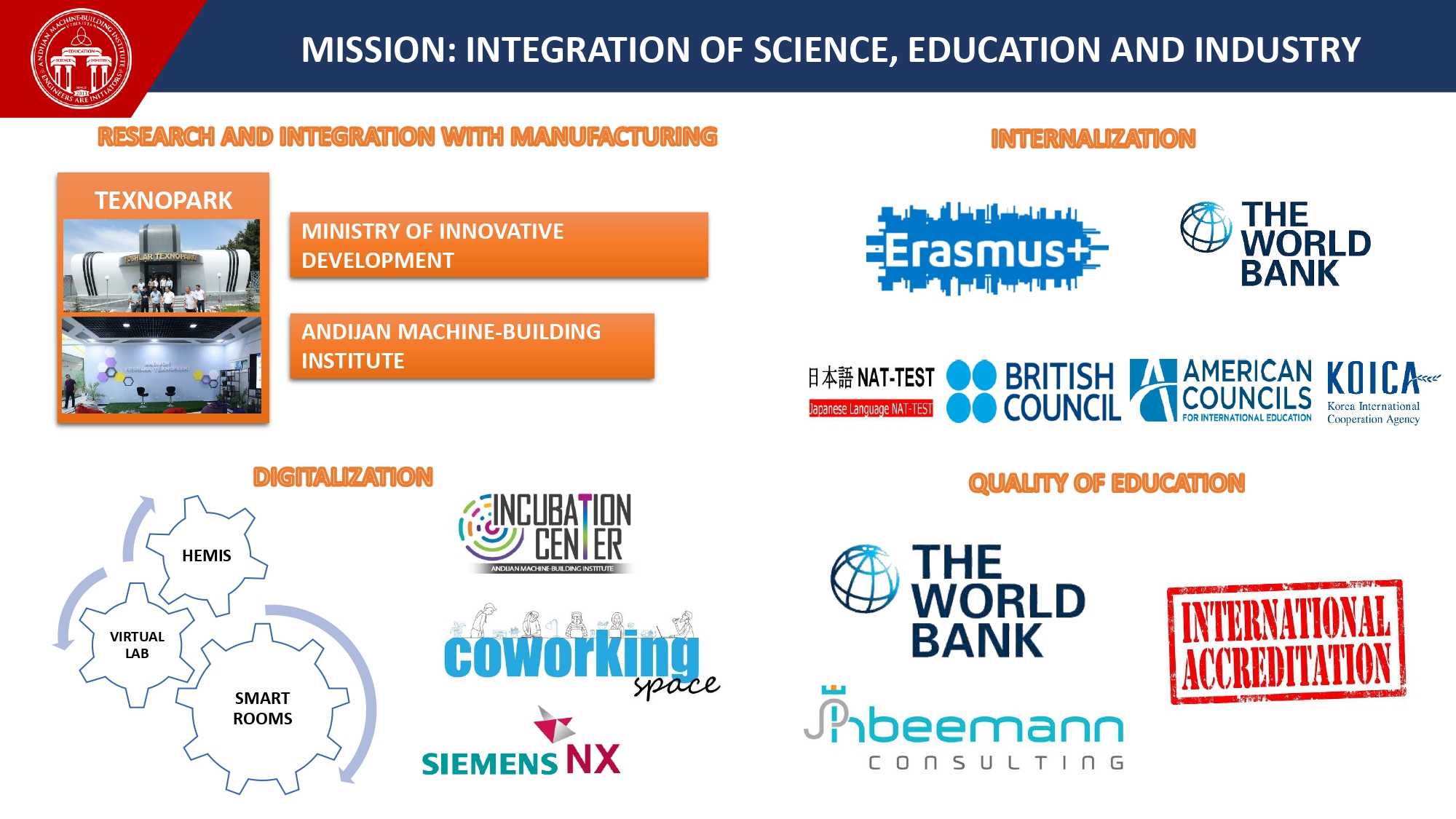Andijan machine-building institute, the decision of the President of the Republic of Uzbekistan dated May 20, 2011 No. Uzbekistan was established on the basis of the decision of the Cabinet of Ministers of the Republic of Uzbekistan No. 214 of July 25, 2011 "On the transformation of the Andijan Institute of Engineering and Economics into the Andijan Institute of Mechanical Engineering".

The mission of the institute is to carry out modern, high-quality educational activities for the implementation of basic and additional educational programs of higher education, teaching-methodical and scientific-research works, as well as other activities in accordance with the legislation of the Republic of Uzbekistan. is to increase. implementation and provision of educational services.
The main tasks of the institute:
- establishing close cooperation with the world's leading scientific and educational institutions, widely introducing advanced pedagogical technologies, curricula and educational-methodological complexes based on international educational standards into the educational process reach;
- active involvement of highly qualified teachers and scientists of foreign partner educational institutions in the educational process, conducting skill classes, educational process;
- Systematic organization of internships, retraining and professional development of masters of republican higher education institutions, young teachers and scientific staff on the basis of foreign partner higher education institutions;
- formation of target parameters for training specialists of higher education institutions, taking into account the requirements of the implemented regional and branch programs, optimization of higher education courses and specialties in the future, comprehensive development of regions and economic sectors;
- further improvement of the educational process, curriculum and programs of higher education on the basis of the wide introduction of new pedagogical technologies and teaching methods, the qualitative renewal of the scientific-educational process of the master's level, and the introduction of modern organizational forms;
- creation of new generation textbooks and their widespread introduction into the educational process of higher education institutions, provision of higher education institutions with modern educational, methodological and scientific literature, including more purchases of new foreign literature and translation, regular updating of literature; funds of information resource centers;
- continuous improvement of the quality and level of professional skills of pedagogic personnel, training and internship of professors and academic staff abroad, PhD and master's degrees of graduates of higher education institutions, higher education institutions and retraining and highly qualified attraction of foreign scientists, teachers and personnel; specialists in the educational process of training centers;
- strengthening the scientific potential of the institute, further developing the science, strengthening its integration with the academic science, increasing the effectiveness and efficiency of the scientific research activities of the professors and teachers of the institute, widely involving talented students in scientific activities;
- To increase the spiritual and moral content of education in the institute, to form the spirit of loyalty to the ideas of independence, high spirituality and national traditions of humanity in students, to strengthen their immunity against foreign ideas and ideologies, and to strengthen critical thinking. extensive educational work;
- construction, reconstruction and overhaul of educational and scientific-laboratory buildings and buildings of higher educational institutions, sports facilities, social and engineering infrastructure, the priority direction of higher education is modernizing educational and scientific laboratories further strengthening by equipping with tools and equipment;
- Equipping higher education institutions with modern information and communication technologies, expanding opportunities for students, teachers and young researchers of higher education institutions to use world educational resources, electronic catalogs and databases of modern scientific literature
- to satisfy the need for intellectual, cultural and spiritual development of a person through higher education and post-higher education;
- For a well-rounded and loyal person, a citizen of an independent state, self-sacrificing, responsible before the people, society and family, who respects national and universal values, enriches and strengthens national traditions, and is a conscientious and honest worker who shapes the future of our country;
- development of science through scientific-research and creative activities of scientific-pedagogical staff and students, use of obtained results in the educational process;
- Training and retraining of highly educated specialists and scientific-pedagogical personnel and improving their qualifications in relevant sectors of the economy;
- preservation and enrichment of moral, cultural and scientific values of the society;
- spreading knowledge among the population, increasing its spiritual, educational and cultural level.
Curricula and subject programs for majors and majors should be constantly updated to meet the needs of the workforce. It is necessary to improve the schedule of the educational process based on the students' time budget, reduce the weight of classroom lessons, and increase the volume of independent work outside the classroom. It is necessary to prepare textbooks and study guides based on the requirements of the time to provide students with high knowledge. For the preparation of highly qualified personnel, it is desirable to strengthen relations with the consumers of personnel, especially in the case of enterprises and organizations, to organize student internships, and to prepare graduation and master's theses. To increase the effectiveness of the educational process, it is necessary to increase the effectiveness of the use of pedagogical and information technologies. It is also necessary to improve the rating system for evaluating students' knowledge. It is necessary to improve the activities of the state certification commissions that assess the level of students' knowledge and training. Increasing the scope of independent work of students is highly effective. It is necessary to improve the types and forms of independent work. It is necessary to improve the system of performance evaluation indicators of departments. In order to increase the scientific and pedagogical potential of teachers, it is appropriate to send them to enterprises and organizations for a 6-month internship. It is necessary to improve the internal certification of teachers. It is necessary to improve control over the fulfillment of hours included in individual study loads by professors and teachers.
